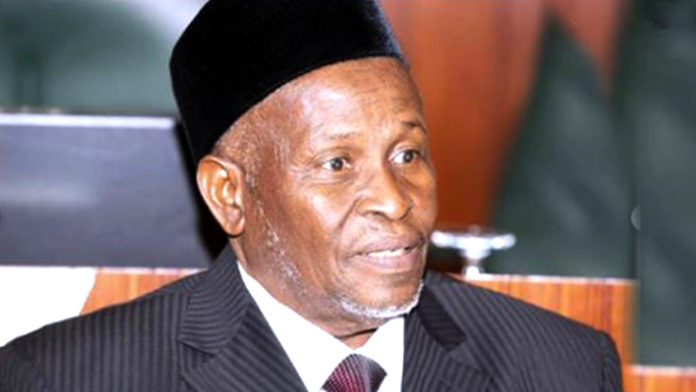The Chief Justice of Nigeria Ibrahim Tanko Muhammad is enduring a torrid battle with dementia and heart disease complications, Peoples Gazette can report, based on testimony of highly competent Supreme Court sources familiar with his deteriorating condition.
Mr. Muhammad was ferried overseas for urgent treatment of his illness, which has been kept under wraps since he assumed office as Nigeria’s top jurist in 2019, two sources working closely with him told the Gazette. Our sources spoke under anonymity to avoid being targeted for interacting with reporters on a matter that was being hushed at the Supreme Court.
Mr. Muhammad’s struggle with dementia, an ailment causing loss of memory, had first manifested when he ordered the appointment of another chief registrar of the Supreme Court, despite the existence of a substantive registrar, Hadizatu Uwani Mustapha, our sources said.
Another source told the Gazette that the CJN also exhibited another dangerous instance of memory lapses when he unveiled plans to “go to the Presidential Villa to meet with President Olusegun Obasanjo” – a former Nigerian leader, whom he wrongly adjudged to be the incumbent President Muhammadu Buhari.
“His illness has been deteriorating and we are all now very concerned that the man might find it difficult to remember his own name soon,” the Supreme Court official said. “He has been doing so many dangerous things.”
Prior to being flown abroad, Mr. Muhammad was moved to Kaduna because his handlers felt it would be easier for people to learn of his ailments if allowed to keep occupying his official residence in Abuja.
Another source familiar with the matter said Mr. Muhammad’s situation had left his son in control of judicial policies in the country, even though they had no formal appointment to play such roles.
The chief registrar of the Supreme Court and a senior aide to the chief justice did not return requests from the Gazette for comments.
A spokesman for the National Judicial Council declined comments about whether or not his principal was being managed for dementia and heart diseases.
The CJN’s health challenge heightens concerns that the heads of Nigeria’s judicial and executive arms of government could be suffering from similar cognitive crises.
Last week, the Gazette exclusively reported President Muhammadu Buhari’s decision to back out of an interactive session with federal lawmakers to render accounts for his handling of national security.

Sources at last week’s national caucus meeting of the ruling APC held at the Presidential Villa — wherein Mr. Buhari finalised his withdrawal from the meeting with parliamentarians — told the Gazette that the move was hinged on fears that the president could be exposed as too frail to govern or not mentally-aware of the heightened security situation in the country.
But the president’s handlers maintain he had no issues with his cognitive capabilities despite all evidence to the country. Mr. Muhammad’s allies had taken a similar approach in handling his memory shortcomings.
Ibrahim Saulawa, an associate justice of the Supreme Court, had disclosed Tuesday that Mr. Muhammad was receiving treatment in Dubai, the United Arab Emirates, having contracted the coronavirus.
Mr. Saulawa’s disclosure was, however, refuted by Supreme Court spokesman Festus Akande, who strongly argued that the chief justice hadn’t tested positive for the viral infection.
Mr. Akande did not clarify reasons for the CJN’s Dubai trip, as well as his conspicuous absence at a ceremony on Monday when dozens of senior advocates were sworn in.
“The Hon. CJN, Justice Ibrahim Tanko Muhammad being unavoidably absent at a function is not enough to plunge into this premeditated conclusion that there’s now anxiety over his health,” the Supreme Court spokesman said in a statement Tuesday night. “I wish to state categorically clear that there is no medical report so far made available by anybody indicating that the Hon. CJN has tested positive for coronavirus.”
Peoplesgazatte





